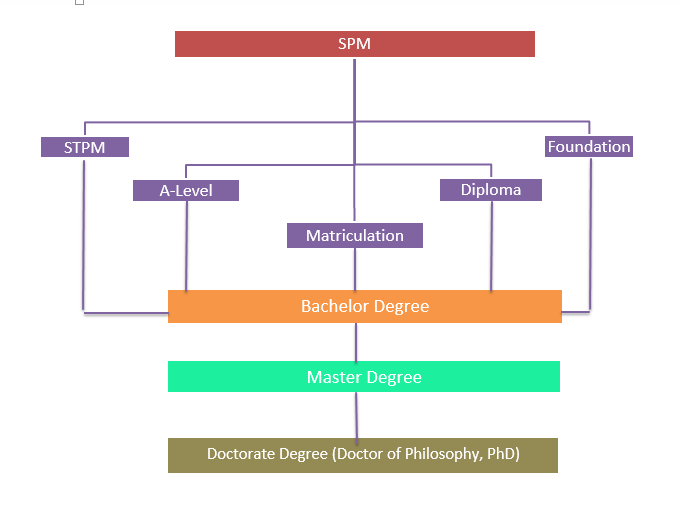Aloha, friends!
This post is especially tailored for all of the SPM-leavers of 2014. Don’t belong to the group? No worries! Feel free to breeze through this post so that you will be able to draft an early plan of what to do right after the SPM.
First and foremost,
 |
| Thumbs up! / PicCredit |
High school experience is such a great and marvellous thing! Do you agree? I suppose during this time period, you might still be thinking about your best friends, roommate, classmates, and all of the things you guys have done together, as well as things that you regret for not doing them before. No worries, I know exactly those feelings. Therefore, I am writing this post to share with you about the things that you can possibly do during this break so that you won't have anything to be regretted later on! Here it goes!
*drum rolls*
1) Future Academic Planning
 |
| Academic Planning Strategy / PicCredit |
Well, I understand that you are seeking for a break time to simply relax, and I must say that you totally deserve it. However, I think that it is not a good idea to be relaxing all the way through your holiday. Aren't you jealous looking at your siblings, seniors and friends who have managed to go for a study abroad program and having people to sponsor them? I bet most of you do! Even if you don't, it is still wise to do a future academic planning so that you will be able to get into an academic program that you are passionate about.
a) Identify your passion and field of interest. Use this Future Study Planning Checklist that my fellow colleagues and I have prepared as rough guideline.
b) Draft the possible pathway that you have in order to achieve what you are targeting for. Know that there are several ways for you to achieve your ambition/dream. Therefore, sketch up your academic pathway and choose the path that you are most comfortable with. Here is an example:
 |
| Academic Paths After SPM |
d) Are you interested in going for a studying abroad program? If you do, here are some of the terms that you would most probably need to know!
• ADP (American Degree Program)
The American Degree Program is a program that is specially developed to prepare students of high calibre for entry into the first year or second year of prestigious American universities in the US. There are many institutions that offer this program. For more details, feel free to check out their website - INTEC / TAYLORS / INTI
• AUSMAT (Australian Matriculation)
The Australian Matriculation Program is a package for selected students to further their studies in Australia and New Zealand. Courses are conducted based on the curriculum set by the SACE Board of South Australia, Adelaide, South Australia. Students who take this course will acquire the South Australian Certificate of Education (SACE) which is recognized by all Australian and New Zealand universities. It is also accepted by universities in the United States and Canada. For more details, here are some of the institutions that offer AUSMAT in Malaysia - INTEC/ SUNWAY/ OTHERS
• A-Level Program
Also known as the Advanced Level course, A-Level Program is a pre-university course offered by tertiary education institutes. A-Levels are considered to be equivalent to form 6 in the UK. The A-Levels is well-known because it serves as one of the possible gateway for students to studying any course in any part of the world as the scope is very wide. A-Levels can take up to 18 months, depending on the specific programs offered by different institutions. With this qualification, you will be able to gain places at leading universities worldwide such as in the UK, Ireland, Australia, Canada, Singapore, India, Germany, Spain and many more! For more details and a list of participating institutions, visit the following – A-Levels in Malaysia
• Study In France Foundation Program by INTEC
Bonjour! Are you interested to dwell within the unique cultures of the French while having the chance to complete your degree there? Here is your chance! The French Program prepares selected students to further their studies in Engineering in French universities approved by the Ministry of Education and Public Services Department of Malaysia. The pre-university studies is held at the language departments of selected institutions. Visit their website here for more details – Foundation Studies: FRANCE
• Study In the Middle East Foundation Program by INTEC
Ahlan wa sahlan! Have you learnt Arabic Language before and feeling like you are having the drive to pursue your studies in the Middle East? The Middle-East Programme (MEP) prepares selected students to further their studies in Egyptian and Jordanian universities approved by the Ministry of Education and Public Services Department of Malaysia in the field of Medicine and Dentistry. The receiving universities in Egypt are Cairo University, Ains Sham University, Mansoura University, and Alexandria University in Egypt, while in Jordan it is the Jordan University of Science and Technology. Students in this programme spend 3 months at INTEC before pursuing their studies in the universities in Egypt and Jordan. Visit their website here for more details – Foundation Studies: Middle-East
2) Get A Driving License
 |
| Pass Driving Exam / PicCredit |
a) Identify the type of license that you wanna take
- Motorcycle / Car / Both
b) Register yourself at the nearest driving driving academy
c) Attend the courses
d) Take the test
e) You're hot to go!
For detailed info or instructions for each step, feel free to check out this website!
3) Expand Your Readings
 |
| You are what you read / PicCredit |
Therefore, it will be a very good idea to expand your readings! Try out different genres of books, especially those that you have never read before. Not only you will be able to be exposed to different ideologies and settings, you will also be able to write better and improve your vocabulary.
Books that I personally recommend:
- 7 Habits series
- Chicken Soup Series
- The Secret series
- Autobiographies of Successful Individuals
- Life Without Limits - Nick Vujicic
- DIAgnosis
- Other Side of The Coin – Aiman Azlan & Ameen Misran
- Novel version of Trending Movies (Hunger Games, Divergent, etc)
- Contemporary books on Religion
4) Develop Your Life Skills
 |
| Level Up Your Life Skills / PicCredit |
This break right after SPM is a perfect time for you to learn and develop skills such as cleaning, cooking, carpentry, plumbing, mechanical, arts and crafts and so on. Personally, I would suggest you to really learn how to cook, especially if you're planning to cut down your monthly expenditure during college. Being able to cook will save you a lot! Other skills such as sewing, carpentry and crafts are also promising. You will be able to fix that torn-pant from the taekwondo practice, create a lot of stuffs on your own using Do-It-Yourself materials. If you are good enough, you can also make some money by selling your own products! Be creative!
 |
| Learn to cook / PicCredit |
 |
| Learn to sew / PicCredit |
5) Participate in Seminars / Programs / Classes
 |
| Attend seminar / PicCredit |
Usually in school, you got to attend some programs and seminars - some that you might like, some that you might not. Regardless of the interest factor, there is always something to be learnt from each program or seminar if you give a good amount of participation and commitment.
So, what makes joining a seminar or program by yourself different? Well, obviously you get to choose what you want to join! There are many kinds of programs that you can possibly join. Examples would be:
- Career Seminars
- Life Skills Development Program
- Adventure/Expedition Program
- Religious Camp
- Baking class
Say, for example, if you are want to be an aerospace engineer. So, try to look for programs or seminars that are related to your career interest or even something that you think might be suitable for you. It would not hurt to try. This is the time for you to explore more on a particular interest by getting first-hand experience sharing from individuals who are already in that field.
Here are a few links to upcoming programs/seminars/classes that I have managed to find:
- MAPCU Higher Education Fair 2015 (17 - 18 January @ MidValley)
- The Star Education Fair 2015 (17 - 18 January @ KLCC; 21 - 22 March @ Penang PISA)
- International Education Fair Malaysia 2015 (14 - 22 March @ Various cities in Peninsular Malaysia)
6) Part-Time Jobs / Internship / Attachment
 |
| Working part time job as a waiter / PicCredit |
Regardless of your reasons, there are always rewards for those who work for them. I myself had once worked with a wedding caterer as a waiter and was paid RM70 for several hours of job. I must say that the pay that I received was pretty decent for just several hours of work. There is a wide array of choices for you to choose. Some of the common jobs that are done by SPM leavers are:
- Wedding Caterer (Waiter, Cashier and etc)
- Academic Tutor; UPSR/PT3/SPM (Centralized/Private/Home)
- Small Business (Bake Sale and etc)
- Tailor (Depends on your skills and abilities)
Other than that, you can also go for an internship or attachment. An internship is a temporary position with an emphasis on on-the-job training rather than merely employment, and it can be paid or unpaid. Having an internship experience is counted as having a working experience in a particular field or career and can greatly boost your skills as well as portfolio. Plus, you will be more likely to be accepted by universities if you have done an internship prior to applying because it makes you outshine the other applicants. Try asking around your teachers, family and friends who might know a company or agency that offers internships to SPM leavers. You can also try looking around at newspaper and internet advertisement, whichever works the best for you.
Another thing is an attachment. Basically, you attach yourself on a mutual agreement with someone who might currently be working in field that you are interested in to observe and gain experience mainly through observation. This is also a good choice for you to start seeing how things work and building up your connection at the same time. Usually, you will need to know some people who can recommend or connect you with people who are willing to have you on board with them. Nevertheless, it is also possible to contact the specific person personally through email, followed with an in-person meeting.
7) Volunteering
 |
| Volunteering for Volunteer Projects / PicCredit |
Volunteering is the act of contributing your time and effort to a worthwhile cause such as a community project. In fact, the spirit of volunteering is deeply rooted in the Malaysian way of life – in the form of ‘gotong-royong’ where members of a neighbourhood or organisation get together to clean or build something.
So, how can you get involved in volunteer work and what can you gain from it?
Know Your Options
There are many volunteering opportunities in Malaysia. Non-profit organisations (NPOs), such as foster homes, are always in need of a helping hand. While it may not be a paid job, volunteer or charity work is a fulfilling way to turn your time into a working experience – all while making a difference in the lives of those in need.
Volunteering can be as simple as helping out at a recycling centre on the weekends. You could even get some friends together and organise a small community project in your neighbourhood. If you want to play an even bigger part, you can get in touch with one of the many volunteer organisations in the country such as:
- iM4U - 1Malaysia for Youth
- Befrienders
- Malaysian National Animal Welfare Foundation (MNAWF)
- Malaysian Volunteer Fire and Rescue Association (MVFRA)
- St. John's Ambulance of Malaysia
- Women's Aid Organization (WAO)
- Yayasan Salam Malaysia
8) Take A Short Course
 |
| Set goal target / PicCredit |
There are also short courses that prepare you for taking an externally administered exam – for example, you could take an English language course at a language centre to prepare for the International English Language Testing System (IELTS) which is administered by the British Council. Besides IELTS, you can also take a short course to prepare for the TOEFL Test. It measures your ability to use and understand English at the university level. And it evaluates how well you combine your listening, reading, speaking and writing skills to perform academic tasks. Plus, TOEFL is widely accepted among so many universities all around the world! So, you can consider it as one of your passport to study abroad. I myself sat for a TOEFL Test before coming here to the United States.
 |
| International English Language Testing System (IELTS) |
Short courses are available for a variety of subjects, ranging from foreign languages to photography to accounting. Usually, short courses are taken to learn or improve skills in an area of interest and/or for career advancement.
They also can serve as an introduction to a subject or skill area that you may not be familiar with. Thus, they are also a good way to find out if you are suited to the course or career that you are interested in.
Here are some sites that you can use to look for a nearest center that offers such kinds of short courses:
- TOEFL Preparation Programme
- IELTS Preparation Programme
- Professional Short Courses (Visual Graphics/App Development/Designing/Video Editing/ETC)
----------------------------------------------------------------------------------------------------
Tadaaa! Coming to the end, aren’t we?
Well, I hope that you are able to gain something beneficial from this post.
Feel free to personally contact me through my email or Facebook account for any inquiries or request if you want me to specifically write on any topic that might be useful and interesting to you and other people as well.
Have a great holiday matey! Utilize your time and make full use out of it!
Ciao!
 |
| Infographic: Options After SPM by The Star |
Born on January 27th 1997, Achmad Bakhtiar bin M Yuni or usually known as Bakhtiar among his peers, is currently a first-year student at Rutgers University, US. Being a recipient of the PETRONAS Sponsorship Programme, he is now majoring in Biology at the university’s School of Arts and Sciences under a 4-years degree programme. He enjoys reading, writing, petting cats, adventuring, being involved in the community and aims to become a significant figure in the field of Biomedical Sciences and Medicine.
He can be reached through: • Email – [email protected] • Facebook – Achmad Bakhtiar / www.facebook.com/bakhtiar97 • Blog – turqoiseazure.blogspot.com
► Read more on Life After SPM? You Wouldn’t Want To Miss These!






